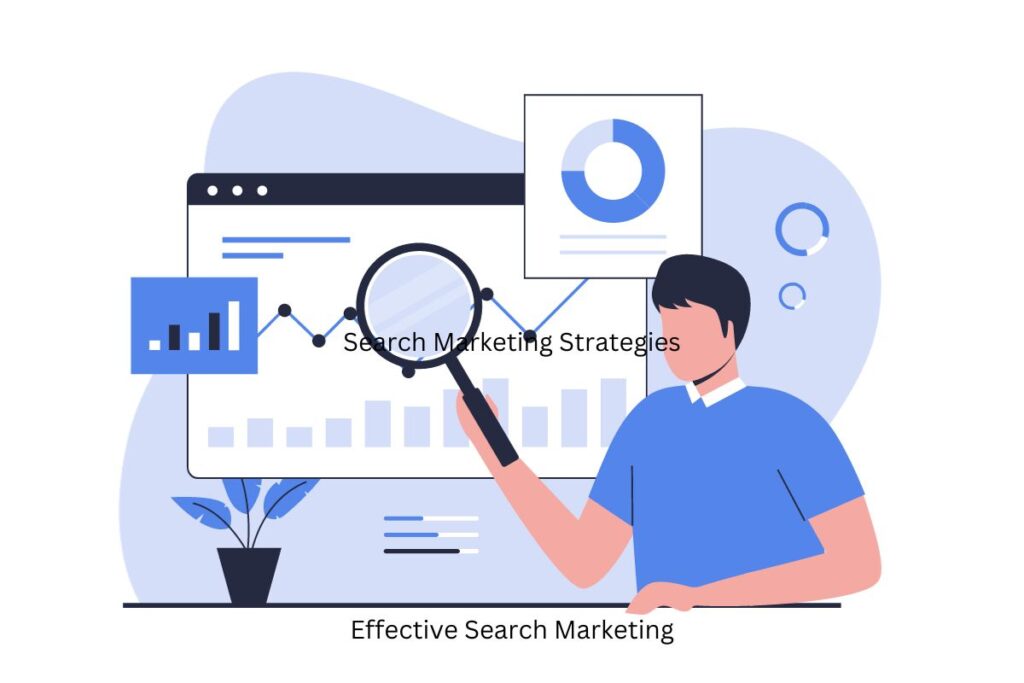Effective search marketing strategies have become instrumental in achieving online visibility, driving traffic, and increasing conversions. This comprehensive guide delves into the world of search marketing, exploring the best practices and strategies to help you reach your target audience and maximize your online presence.
Understanding Search Marketing

Search marketing, often referred to as search engine marketing (SEM), is a digital marketing strategy that revolves around optimizing a website’s visibility in search engine results pages (SERPs). This strategy encompasses two primary components:
1, Search Engine Optimization (SEO): SEO focuses on improving a website’s organic (unpaid) search engine rankings. It involves on-page and off-page optimization techniques to enhance a site’s quality, relevance, and authority, thereby making it more appealing to search engines.
2. Pay-Per-Click Advertising (PPC): PPC, on the other hand, involves paid advertisements that appear in search engine results. Advertisers bid on specific keywords, and they pay when users click on their ads. Google Ads is a popular platform for PPC advertising.
Importance of Effective Search Marketing Strategies
Effective search marketing strategies have become a cornerstone of digital marketing for several compelling reasons:
1. Visibility and Traffic: People increasingly turn to search engines like Google to find information, products, and services. By implementing search marketing strategies, you can ensure that your website appears in the relevant search results, thus driving more organic and paid traffic.
2. Targeted Audience Reach: Search marketing allows you to target specific keywords and demographics, ensuring your content is shown to a relevant audience actively searching for what you offer.
3. Measurable Results: With tools like Google Analytics and advertising platforms’ performance metrics, you can track and measure the effectiveness of your search marketing campaigns, enabling data-driven decision-making.
4. Cost-Effective: Compared to traditional advertising methods, search marketing can be more cost-effective, especially when well-optimized, as you pay only when users interact with your content.
5. Competitive Advantage: Staying up-to-date with the latest search marketing trends and strategies can give you a competitive edge in your industry.
Effective Search Marketing Strategies
Now that we’ve established the importance of search marketing, let’s explore some effective strategies to help you succeed in this ever-changing field:
1. Comprehensive Keyword Research

Keyword research is the foundation of any successful search marketing strategy. Start by identifying the keywords and phrases your target audience uses to search for products or services related to your business. Tools like Google Keyword Planner and SEMrush can help you discover relevant keywords and estimate their search volume.
It’s essential to strike a balance between broad and long-tail keywords. Broad keywords have high search volume but can be highly competitive, while long-tail keywords are more specific and can yield higher conversion rates. Incorporate these keywords into your website content, including titles, headers, meta descriptions, and body text.
2. On-Page SEO Optimization
On-page SEO optimization is about making your website search engine-friendly. Here are some key on-page SEO elements to focus on:
- Quality Content: Create valuable, informative, and engaging content that resonates with your target audience. High-quality content is more likely to rank well and attract backlinks.
- Meta Tags: Craft compelling meta titles and descriptions for each page, incorporating your target keywords.
- Optimized URLs: Ensure your URLs are clean, descriptive, and contain relevant keywords.
- Header Tags: Use header tags (H1, H2, H3) to structure your content and signal the hierarchy of information to search engines.
- Image Optimization: Compress images to improve page load times and use descriptive alt text for images.
- Mobile Optimization: Optimize your website for mobile devices, as Google considers mobile-friendliness a ranking factor.
3. Link Building

Link building is a critical off-page SEO strategy. It involves acquiring high-quality backlinks from other reputable websites to boost your site’s authority and trustworthiness in the eyes of search engines. Here are some effective link building tactics:
- Guest Blogging: Contribute guest posts to authoritative websites in your niche, including a backlink to your site in your author bio or content.
- Broken Link Building: Find broken links on relevant websites and offer to replace them with links to your content.
- Content Promotion: Share your content on social media and with your email subscribers to encourage natural backlinks.
- Outreach: Reach out to webmasters and bloggers in your niche to request backlinks or collaborations.
4. Local SEO
If your business serves a local audience, optimizing for local search is crucial. Local SEO strategies include:
- Google My Business: Create and optimize your Google My Business listing, ensuring accurate information, high-quality images, and customer reviews.
- Local Citations: Ensure your business information is consistent across online directories, local websites, and social platforms.
- Localized Content: Create content that caters to local interests and needs, emphasizing your geographical relevance.
5. Content Marketing

Content marketing goes hand in hand with search marketing. Regularly publishing high-quality, informative, and engaging content can help you capture the attention of both search engines and your target audience. Content can take various forms, including blog posts, videos, infographics, and more. Make sure to share your content on social media and other promotional channels to extend its reach.
6. Pay-Per-Click Advertising
For immediate and targeted results, consider incorporating PPC advertising into your search marketing strategy. Platforms like Google Ads and Bing Ads allow you to create highly targeted campaigns, set budgets, and track results. Here are some tips for effective PPC advertising:
- Keyword Targeting: Bid on relevant keywords with a good balance of search volume and competition.
- Ad Copy: Craft compelling ad copy that highlights your unique selling points and encourages clicks.
- Landing Pages: Create dedicated landing pages that align with your ad’s messaging and encourage conversions.
- Ad Extensions: Use ad extensions to provide additional information and improve ad visibility.
7. Regular Monitoring and Adaptation
Search marketing is an ever-evolving field, and what works today may not work tomorrow. It’s essential to continuously monitor your search marketing campaigns, track performance metrics, and adapt your strategies accordingly. Consider using A/B testing to optimize your landing pages and ad copy, and stay informed about algorithm updates from search engines like Google.
8. User Experience (UX) and Page Speed
Search engines increasingly prioritize user experience. Slow-loading pages and poor UX can negatively impact your rankings. Optimize your website for speed, mobile responsiveness, and ease of navigation to ensure a positive user experience.
9. Social Media Integration
Integrating your search marketing efforts with social media can be a potent strategy. Share your content on social platforms, engage with your audience, and use social signals as a ranking factor.
10. Data Analysis and Reporting
Regularly analyze your data to identify what’s working and what’s not. Use tools like Google Analytics, Google Search Console, and other analytics platforms to gain insights into user behavior and campaign performance. Adjust your strategies based on this data to maximize your ROI.
Conclusion
Effective search marketing strategies are integral to achieving online success in the highly competitive digital landscape. By conducting comprehensive keyword research, optimizing your website, building high-quality backlinks, and engaging in content marketing, you can enhance your online visibility and drive more traffic. Combine these strategies with the monitoring of performance metrics, a focus on user experience, and adaptation to industry trends, and you’ll be well on your way to mastering the art of search marketing. Keep in mind that search marketing is an ongoing effort, and staying current with best practices and algorithm updates is key to long-term success.



